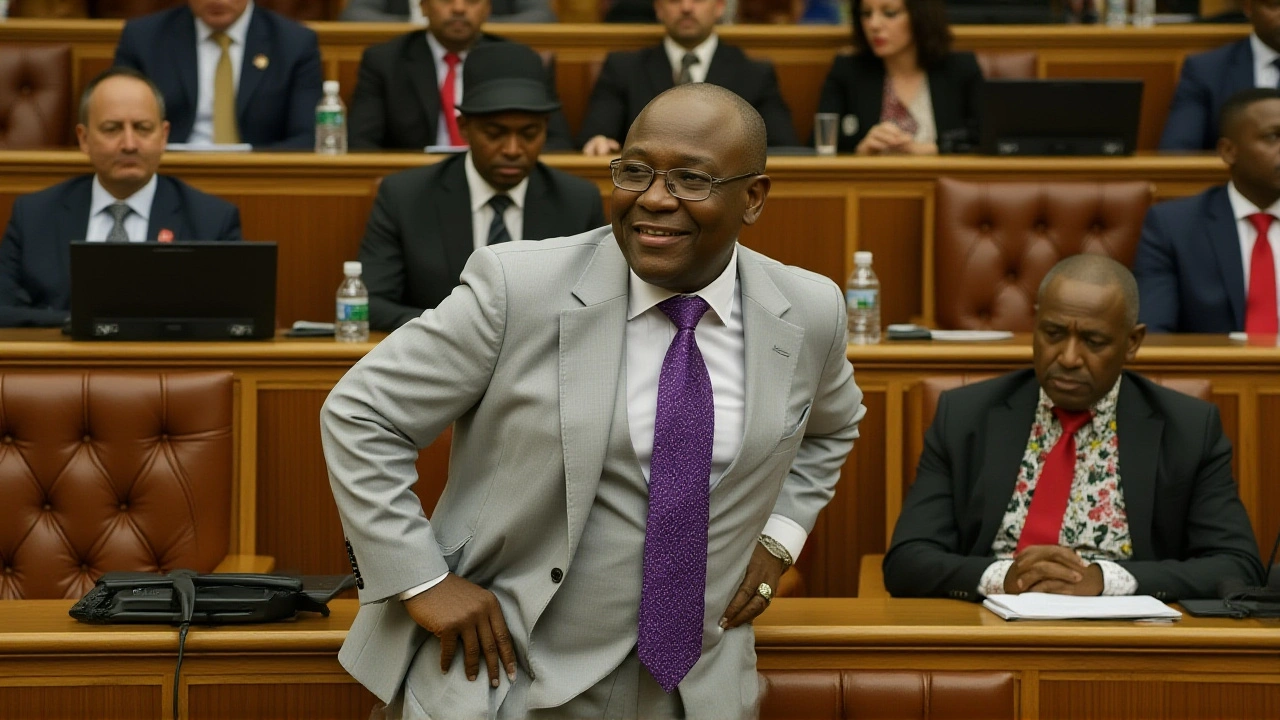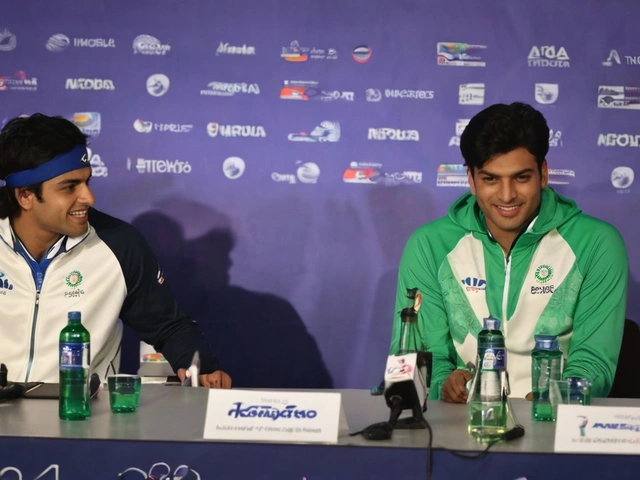When Malusi Gigaba walked out of the Palm Ridge Magistrate’s Court on November 19, 2025, he wasn’t just leaving a courtroom—he was stepping away from a political life that once reached the highest echelons of South African power. The former Minister of Public Enterprises, a close ally of ex-President Jacob Zuma, voluntarily resigned from all African National Congress (ANC) roles the next day, after being formally charged with corruption in the R54-billion locomotive procurement scandal. It’s not just another case. It’s the latest chapter in South Africa’s long, painful reckoning with state capture—and this time, the accused isn’t a shadowy businessman. It’s a man who once sat at the cabinet table.
From Cabinet to Courtroom
Gigaba, 54, appeared alongside four former Transnet executives: Brian Molefe, Siyabonga Gama, Anoj Singh, and Thamsanqa Jiyane. All five were charged by the Investigating Directorate Against Corruption (IDAC) with fraud, corruption, and conspiracy related to the purchase of 1,064 locomotives between 2010 and 2014. The deal, meant to modernize South Africa’s rail network, ended up costing taxpayers nearly R54 billion—over $2.9 billion—and delivered little in return. The state alleges Gigaba received cash payments from members of the Gupta family in exchange for fast-tracking contracts to companies like China South Rail and General Electric.It’s a pattern that’s become chillingly familiar. A minister. A state-owned enterprise. A family with outsized influence. And a trail of broken procurement rules. The 2018 forensic report by the Public Protector already pointed fingers at Molefe for hiding cost overruns from Gigaba—but the State Capture Inquiry later revealed something darker: Gigaba didn’t just fail to act. He actively encouraged Transnet to bypass National Treasury rules. He signed off on appointments that cleared the way for corruption. And now, after years of denial, he’s facing criminal charges.
The ANC’s Step-Aside Rule: Discipline or Double Standard?
The ANC’s acting spokesperson, Nonceba Mhlauli, called Gigaba’s resignation "disciplined" and "mature." ANC Secretary General Fikile Mbalula was even clearer: "If Malusi is charged with corruption, he will have to step aside. He will do that voluntarily." But here’s the twist: the party’s step-aside rule, adopted at its 2022 national conference, has been applied unevenly. Critics point out that loyalists of Zuma—like Gigaba—are being targeted, while allies of current President Cyril Ramaphosa, even those under investigation, remain in power. The perception? This isn’t just about ethics. It’s about power struggles within the ANC.What makes Gigaba’s case especially sensitive is his history. He resigned as minister and MP in 2018 after a court found he lied under oath during testimony before the Standing Committee on Public Accounts. He returned to Parliament in 2019, only to be sidelined again. Now, he’s out once more—this time, not by party pressure, but by legal necessity. Whether it’s genuine accountability or political expediency, the optics matter. The public remembers. And they’re watching.
The Transnet Deal: How R54 Billion Vanished
Transnet SOC Ltd. is more than a railway company. It’s the backbone of South Africa’s freight system—handling 90% of the country’s rail cargo, managing key ports like Durban and Cape Town, and operating pipelines that move fuel across provinces. When it signed those three locomotive contracts, it wasn’t just buying trains. It was betting the future of national logistics.The state alleges the deals were rigged. Instead of open bidding, the process was manipulated to favor companies tied to the Guptas. Documents show procurement panels were stacked. Technical evaluations were ignored. Cost escalations were hidden. And Gigaba, as minister, was the final sign-off. The result? Locomotives delivered late, underperforming, and riddled with defects. Some sat unused for years. Others broke down within months. The financial loss? Estimated at over R15 billion in direct waste alone.
For context: that’s more than the annual budget of the entire Eastern Cape Department of Education. It’s enough to build 300 new primary schools. Or fund 10,000 nurses’ salaries for a year. Instead, it went into offshore accounts and luxury properties linked to the Gupta network.
What’s Next? The January 30 Deadline
The case has been postponed to January 30, 2026, for docket disclosure and transfer to the High Court. That’s not just a date—it’s a ticking clock. Once the full evidence is shared, Gigaba’s legal team will have to respond. His lawyers are already reviewing documents, but the weight of the case is undeniable. The IDAC has already compiled over 12,000 pages of evidence, including bank records, WhatsApp messages, and internal Transnet emails.There’s also the political ripple effect. The ANC is already fractured. Gigaba’s fall could embolden reformers within the party—or deepen the divide between Zuma loyalists and Ramaphosa’s faction. Meanwhile, the public is asking: If Gigaba is charged, why aren’t others? Why did it take 11 years for this to happen?
A Legacy in Ruins
Malusi Gigaba was once hailed as a rising star—a quiet, devout Zulu Christian who climbed from provincial politics to national leadership. He was seen as a technocrat, not a flamboyant politician. But now, his name is tied to one of the most brazen corruption scandals in modern South African history. His resignation may be voluntary, but the damage is permanent.What’s left? A broken rail system. A shattered public trust. And a question that lingers: How many more ministers are still in office, waiting for their day in court?
Frequently Asked Questions
Why is the ANC’s step-aside rule being applied now, but not to others?
The ANC officially requires members charged with corruption to step aside, but enforcement has been inconsistent. Critics note that while Zuma loyalists like Gigaba and Molefe have been removed, figures linked to President Ramaphosa—such as former Public Works Minister Thulas Nxesi, who faced similar allegations—are still in party leadership. The timing suggests political targeting, not uniform discipline.
How did the Gupta family influence the Transnet deal?
Evidence from the State Capture Inquiry shows the Guptas used their close ties to former President Zuma to pressure Transnet officials. They allegedly funneled R200 million in kickbacks through intermediaries to secure contracts for companies like China South Rail. Emails and WhatsApp messages revealed Gupta family members directly instructing Transnet executives on tender outcomes, bypassing procurement boards entirely.
What happened to the locomotives bought in the scandal?
Of the 1,064 locomotives purchased, over 300 were deemed unfit for service due to mechanical failures and poor engineering. Many remain stored in yards in Kimberley and Bloemfontein, rusting. Transnet admitted in 2023 that only 41% of the fleet was operational. The cost to repair them exceeds R8 billion—money that could have been spent on upgrading existing infrastructure.
Is there a chance Gigaba could be acquitted?
Legally, yes. But the evidence is substantial: bank records show cash deposits matching Gupta-linked payments, internal emails show Gigaba approving appointments of Gupta allies, and forensic reports confirm he was informed of irregularities but took no action. His defense may argue he was misled—but the State Capture Inquiry already found he ignored warnings. An acquittal would require proving he had no intent to corrupt, which is a high bar.
What does this mean for South Africa’s anti-corruption efforts?
This case is a test. If a former minister can be prosecuted and removed without political interference, it signals real progress. But if the trial drags on for years without resolution—or if Gigaba is quietly let off—it will confirm public fears that the system protects the powerful. The IDAC has already secured convictions in three other state capture cases since 2023. Gigaba’s trial will be the most high-profile yet.
Who is next in line for charges in the Transnet scandal?
The IDAC has confirmed it’s investigating at least seven more individuals, including former National Treasury officials who signed off on the deals and two current Transnet board members. One senior official, who requested anonymity, told EWN that "the paper trail leads to Pretoria, not just Johannesburg." The next wave of charges could include figures still holding public office.







Comments
Orlaith Ryan
This is why we need real accountability, not just performative resignations. People are tired of empty promises!
Let’s hold everyone accountable-no exceptions.
Jacquelyn Barbero
R54 billion could’ve built hundreds of schools, hospitals, and clean water systems... instead, it vanished into offshore accounts. 🤦♀️
It’s heartbreaking to see how much suffering was traded for luxury cars and private jets. We deserve better.
toby tinsley
There’s a quiet tragedy here: a man who once represented hope now symbolizes decay. Not because he was evil, but because systems warped him-and he let them.
It’s not just about Gigaba. It’s about how easily institutions can be hollowed out from within, one signature at a time.
Chris Richardson
Honestly, the fact that this is even news is sad. We’ve seen this movie before-same players, different names.
What’s new is that the public is finally paying attention. Maybe this time, the courts won’t let them walk.
Mark Archuleta
The structural failures here are massive-procurement collapse, governance vacuum, state capture as institutional practice. This isn’t rogue actors, it’s systemic rot.
Fixing it requires more than prosecutions. We need transparency tech, independent oversight bodies, and citizen audit tools. Otherwise, it’ll just repeat.
Pete Thompson
Let’s be real-this is all a political witch hunt. The ANC is just cleaning house to appease the West. Gigaba’s a pawn. The real culprits? The IMF, the World Bank, and the global elites who wanted South Africa’s resources all along.
Wake up. This isn’t corruption-it’s neocolonial sabotage.
Richard Berry
wait so the locomotives are just sitting there?? like rusting in a field?? 😳
that’s wild. imagine spending all that money and getting nothing back. what a mess.
Sandy Everett
I keep thinking about the nurses who could’ve been hired, the classrooms that could’ve been built. This isn’t just theft-it’s stolen futures.
Every child in the Eastern Cape who didn’t get a textbook because of this deserves justice.
J Mavrikos
The real story isn’t Gigaba-it’s the 12,000 pages of evidence that no one’s talking about. Who else signed off? Who else knew? The system didn’t fail-it was designed this way.
Let’s demand public access to those documents. Not just for the trial-for the truth.
Stuart Sandman
They’re calling this corruption? Please. This is what happens when you let the Zulus run the country. The Guptas were just tools. The real crime? Letting tribal politics override real governance. The ANC is a broken machine-and it’s time to scrap it.
DJ Paterson
There’s something deeply human in how slowly justice moves here. Eleven years. Eleven years for a man who signed papers to watch billions vanish.
It’s not just about guilt or innocence. It’s about whether we, as a society, still believe in repair. Or if we’ve accepted decay as the new normal.
Maybe that’s the real trial.